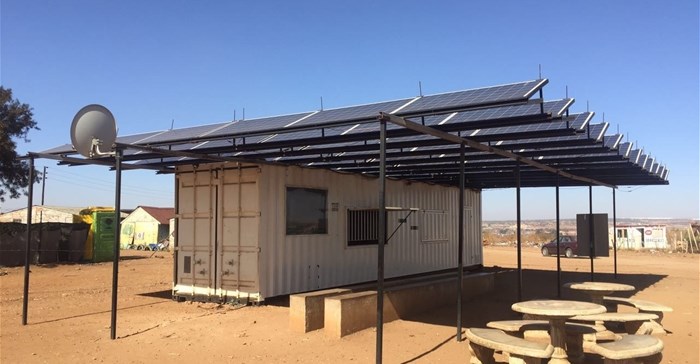
In informal settlements in Gauteng such as Mooiplaas, just outside of Centurion as well as Soshanguve in Pretoria, ePower has introduced affordable electricity solutions in the form of a solar powered community centre set-up on a 40-foot container where services such as mobile phone battery charging, free wi-fi connectivity, internet browsing are available to the public.
“We have rolled out three ePower containers this year, two in South Africa (Mooiplaas and Soshanguve) and one in Zambia. We have interest for five more to be rolled out in Botswana during the first quarter of 2017 and we have another going to Namibia. These are exciting times for our business,” explains Tariq Yusuf, co-founder of ePower Holdings.
The industry continues to grow largely thanks to support from businesses and government who increasingly regard it as a cost-effective alternative energy generator with huge potential to help deliver lower-cost energy, encourage job creation and stimulate local economies.
He describes the intricacies of starting a business in the solar industry in South Africa: This enterprising organisation is not only changing people’s lives but is also looking to partner with like-minded investors in the energy sector who are committed to creating opportunities for entrepreneurs in the rural markets of South Africa and the rest of Africa.
“They are many opportunities for people to get involved in solar products. ePower is a solar business for people to get involved with as it can be profitable and sustainable for African markets,” Yusuf says.
ePower is working to empower the world’s underdeveloped communities through the application of solar energy as an alternative to paraffin, gas, candles which often have disastrous consequences for the people who use them.
“A solar energy business can be exciting and rewarding with impressive growth potential. These generally require a heavy initial investment, but a number of grants and tax incentives help solar energy companies to get off the ground. We entered this industry because it offers a range of benefits to business, utility companies and households, including the 100% renewable nature of the energy source.
"On top of that, we went the social entrepreneurship route because we want to make the world a better place and bring necessities to people who need them the most, all while ensuring that it makes business,” he explains.
Maybin Madiba Mudenda, a businessman from Zambia who specialises in private equity and has invested in some of the ePower projects in his home country, says:“This is a sustainable project that can help a lot of rural communities who are not connected to the grid. Zambia is also facing many power challenges even with the people that are connected to the grid. In addition, it is a good business investment with good returns.
“There are almost 11 million people living off the grid in Zambia. I think it will create a difference in the way people are living and thinking as they will now have access to power albeit in a small way. This means access to TV, wi-fi connection and many additions to come. I would like to see the ePower project work in rural Africa with the support of the international donors, young entrepreneurs and government support,” concludes Mudenda.